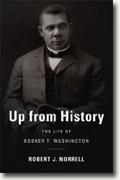Up from History
Robert J. Norrell
book reviews:
· general fiction
· chick lit/romance
· sci-fi/fantasy
· graphic novels
· nonfiction
· audio books
· author interviews
· children's books @
curledupkids.com
· DVD reviews @
curledupdvd.com
newsletter
win books
buy online
links
home
for authors
& publishers
for reviewers

 |
Up from History: The Life of Booker T. Washington Robert J. Norrell Belknap Press Hardcover 528 pages January 2009 |
|
As a child in the 1950s, I recall reading Booker T. Washington's compelling autobiography, Up from Slavery, whose title inspired the current review of the life and philosophy of this dynamic but now largely forgotten African American leader - forgotten, or some would say buried, in the dusty pages of American racial history.
In Washington's day, the divide between black and white in America was all but unbridgeable. Few whites believed former slaves capable of independent existence, and generally, African Americans were considered to be of low moral character and intellectual capacity. Washington and his colleague, the brilliant scientist George Washington Carver, presented the ideal face of African American accomplishment. When Booker T. Washington was invited to dinner at the White House by Theodore Roosevelt, insinuations were made about his sitting at the same table as Roosevelt's teenaged daughter; white supremacist Democrat Ben Tillman announced that "The action of President Roosevelt in entertaining that nigger will necessitate our killing a thousand niggers in the South before they will learn their place again." "This nigger" was a man who had traveled the world, spoken to heads of state and headline-makers of all races and nationalities, a man whose leadership of his race during his lifetime was rarely questioned. One challenge arose, however, from someone of his own race, eventually stifling the voices of praise for Washington's prodigious attainments. W.E.B. DuBois, anxious to promote a radical racial tactic among his fellow blacks, set Washington up as the exemplar of what would later be called "Uncle Tomism." Claiming that Washington, despite his popularity verging on veneration among Southern blacks, was a compromiser and not a fighter, DuBois influenced future generations, particularly the propagators of the Harlem Renaissance who uniformly decried the Tuskegee director as everything from a "sell-out" to a "frightened little man like the Wizard of Oz." Layer after layer of disapprobation were heaped on the memory of Washington so that by the time Martin Luther King arose as a force among his people, it was not politically savvy to quote the former slave, and King soon dropped Washington's ideals from his rhetoric if not from his heart. Robert J. Norrell is Bernadette Schmitt Professor of History at the University of Tennessee. His book is timely, demonstrating how a man whose father was white and whose mother black, who rose from humble circumstances to achieve great prominence, can tumble to obscurity, his reasonable views drowned out by louder, more radical voices, voices no doubt strained with envy. Originally published on Curled Up With A Good Book at www.curledup.com. © Barbara Bamberger Scott, 2009 |
|
|
|
 Click here to learn more about this month's sponsor! |
|
| fiction · sf/f · comic books · nonfiction · audio newsletter · free book contest · buy books online review index · links · · authors & publishers reviewers |
|
| site by ELBO Computing Resources, Inc. | |
 Born a slave, Washington lived most of his life as a free black and was one of the early students of the then-mission college the Hampton Institute. One of Hampton's brightest and best, Washington's oratorical skills and willingness to do exactly what he was told in order to advance himself made him noticeable to the white director, who recommended him for a job which by rights should have gone to a white man – that of director of the newly founded Tuskegee Institute in rural Alabama. Determined (he had gotten himself to Hampton by walking until he found it, heading east), organized (he had learned early on that to earn a wage, he would have to conform to white people's expectations both in skills and demeanor) and educated, Washington set out to make Tuskegee a model for what black people like himself, emerging from a legacy of slavery, could make of themselves. To make the institute work, Washington made the students work - baking the bricks to build the buildings, cleaning the rooms
and managing the farm to provide meals, while not sacrificing academic progress. Washington believed that to achieve equality, former slaves would need to prove to whites that they deserved it by taking care of themselves and creating their own infrastructure, in today's parlance.
Born a slave, Washington lived most of his life as a free black and was one of the early students of the then-mission college the Hampton Institute. One of Hampton's brightest and best, Washington's oratorical skills and willingness to do exactly what he was told in order to advance himself made him noticeable to the white director, who recommended him for a job which by rights should have gone to a white man – that of director of the newly founded Tuskegee Institute in rural Alabama. Determined (he had gotten himself to Hampton by walking until he found it, heading east), organized (he had learned early on that to earn a wage, he would have to conform to white people's expectations both in skills and demeanor) and educated, Washington set out to make Tuskegee a model for what black people like himself, emerging from a legacy of slavery, could make of themselves. To make the institute work, Washington made the students work - baking the bricks to build the buildings, cleaning the rooms
and managing the farm to provide meals, while not sacrificing academic progress. Washington believed that to achieve equality, former slaves would need to prove to whites that they deserved it by taking care of themselves and creating their own infrastructure, in today's parlance.